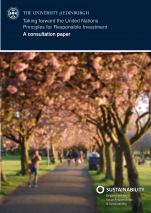Principles and investment: the balancing act

Welcome to the first in a series of, what we hope will be, thought provoking blogs exploring our contribution to social responsibility and sustainability at the University and beyond.
As Director of Social Responsibility and Sustainability it’s my job to help the University become a world leader in socially responsible and sustainable practice, and my department was newly established to help make that happen.
Of course, our ambitions are not new. The University has long acknowledged the importance of ethical and environmental issues and made best efforts to do something about them. With the establishment of our department we want to take those efforts to the next level.
Our commitment
The University’s strategic plan contains a clear commitment to ‘make a significant, sustainable and socially responsible commitment to Scotland, the UK and the world’. In response, we already have a social responsibility and sustainability strategy and a climate action plan.
We want to manage our own impacts, teach our students about the big global challenges of the twenty-first century, and apply our knowledge and research to making a real contribution to solving local and global issues. Here’s how we demonstrated this commitment last year.
Our current strategies are now being complemented by the development of a socially responsible investment approach.
Responsible Investment
We are currently in the middle of an important consultation with the staff, student and donor community of the University. Our consultation asks some key questions about what it means to be a responsible investor.
Students and student groups such as People and Planet have been campaigning for many years on these issues, and the University has had a socially responsible investment policy in place since 2003. None the less, it is timely to re-evaluate this.
What Should We Do?
The University has significant endowment funds. That is, monies donated by alumni and others for specific reasons to advance learning, education or other socially valuable activities.
Endowment funds are a key component of the University’s ability to meet our objectives and ensure generations to come have the opportunity to learn, grow and research. Our focus has been working out how we can continue to manage and protect these funds whilst being a responsible investor.
The University has a number of responsibilities when it comes to these investments that it needs to balance:
- An obligation to current and future donors
- Responsibility to current and future staff and students
- Environmental impacts/implications
- Social obligations/ Responsibility to the global community
- Ethical expectations
Investment, by its very nature, tries to find ways to make a profit on initial capital. In our case this profit allow us to meet our other objectives as an academic and research institution.
But how do we balance these responsibilities and what are our objectives? In classic university parlance, that question is ‘contested’ i.e. at the moment it’s not completely clear what we mean and how we should proceed.
There are quite a few views, inside and outside the University, on what to do and how to do it. For example, see this from People and Planet or this post from Edinburgh University academic Tim Hayward, or this counter-view from Harvard.
The University currently has £280+million in endowment funds. To you and me that is a lot of money, but if you think about it as a fraction of the total amount of money invested in the world, or even in the UK, it is very small. That said, the sum is large enough to make a significant difference if targeted in a smart way.
Our reputation as a leading university means that we expect our actions to have knock-on impacts.
When it comes to investment, our choices as a University not only impact our investors in monetary ways but also act as a wider reflection of our values. This reverberates beyond action to inform wider understandings of corporate responsibility. It has implications that extend far beyond the realm of the University and it’s immediate environment.
That’s why it is so important that we are not only clear on what our responsibilities and objectives are, but what the values are that underpin them.
The Consultation
In order to address these questions we have launched an inclusive consultation process.
The consultation sets out 12 questions for consideration, covering key principles to inform our overall approach, a potential strategic approach to investment to meet those principles, and organisational consequences like transparency, sources of advice and so on.
Sample question: Avoidance of Investment ‘In-Principle’
Circumstances may arise where it is felt that investment activities are simply incompatible with the ethos and values of the university. For example, the University has taken the decision to divest from tobacco. The consultation asks by what process or methodology should the University should consider these questions?
These are difficult issues and we want to make sure we gain as many views as we can prior to coming to a decision on how to move forward. Staff and students are encouraged to take part in the consultation.
You can read the consultation document here. We are running our consultation until the 7th March 2014.
I look forward to hearing your views.
– Dave





Recent comments